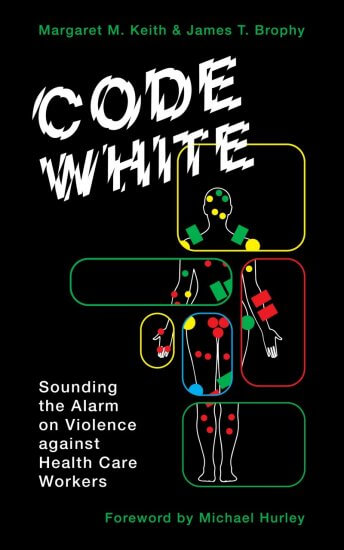New book sheds light on violence against health-care workers
Since the COVID-19 pandemic, health-care workers have been thrust into the spotlight and heralded as heroes. From a nightly clap to honking horns or hanging signs in windows, the world has shown support to those in the frontlines. However, a new book sheds light on the dark side of health care that its authors hope will shock Canadians into action.
Code White is based on four years of research and more than 100 interviews with nurses, personal support workers, aides, porters, clerical workers, and cleaning staff who detail incidences of abuse in health settings. The term “code white” refers to a violent incident or threat of violence in a health-care setting.
Written by Athabasca University (AU) sociology tutor Dr. James T. Brophy and his University of Windsor colleague Dr. Margaret M. Keith, they tell the stories of these workers and, in doing so, are advocating for change.
We had worked for over 40 years in occupational health and had not heard very much about the prevalence of violence in health care,” Brophy said. “We were shocked.
Brophy said he and Keith started their research after being invited to a conference organized by the Ontario Council of Hospital Unions and Canadian Union of Public Employees (CUPE). What they heard about violence in health care opened their eyes.
Violence often overlooked

The majority of the violence against health-care workers, he said, is directed at women, many of whom face “dangerous risks” that often go overlooked.
“One reason is that the fear of reprisals permeates the culture of health care and keeps these workers from speaking publicly about what is happening,” Brophy said.
“Violence is so ubiquitous and pervasive that it now has become normalized and viewed as simply part of the job.”
The book is based on three separate peer-reviewed studies, led by Brophy and Keith, that explored the experiences of workers in Ontario health facilities. The first two examined violence and abuse in hospitals and long-term care facilities, and the third focused on the experiences of workers during the first few months of the COVID-19 pandemic. The book expands on these findings and recommendations to include the rest of Canada and other countries.
All three studies found significant evidence of violence against health-care workers—as told by the workers themselves.
Study participants described violence that included physical and verbal abuse, situations often exacerbated by long wait times and inadequate safety measures. Poor communication between different health professions and occupational groups regarding potentially violent situations were other contributing factors. For some patients, even being in the hospital setting itself could trigger altercations.
Underfunding and understaffing part of the problem, researchers say
The researchers theorize that “decades of underfunding and understaffing” and the privatization of facilities such as long-term care have contributed to the problem. This could explain why violence in the workplace has long gone unnoticed or ignored.
Brophy said one reason for compiling the research into a book was that he wanted readers to raise their voices and demand change.
“We need a serious public examination of our health-care system that includes healthcare workers and their voices and experience,” Brophy said.
In terms of solutions, whistleblower protection for health-care workers could help solve the crisis, he added. This would give workers legally binding protections that empower them to speak out without fear of retribution.
In May 2022, Code White, was awarded the Canadian Association for Work and Labour Studies‘ Leo Panitch Book prize for the best book in work and labour studies in Canada in 2021.